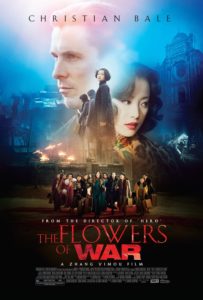Director: Zhang Yimou
Writer: Liu Heng, Geling Yan
Cast: Christian Bale, Ni Ni, Zhang Xinyi, Tong Dawei, Atsuro Watabe, Shigeo Kobayashi, Cao Kefan
Running Time: 146 min.
By Jacob Walker
Zhang Yimou’s underrated war film; 2011’s The Flowers of War, provides a timely reminder that even though we are living through uncertain times, as a species we have experienced and survived much worse. Through urban warfare, the 20th century represented cruelty and killing on a scale not documented before, which is represented here by the Japanese occupation of Nanjing.
The film, based on the novel 13 Flowers of Nanjing by Geling Yan, transports the audience to 1937 Nanjing, during the second Sino-Japanese War. The city is already in ruins, as Japanese soldiers are fighting the remnants of the Chinese resistance and targeting civilians. We are introduced to John Miller (Christian Bale) whose status of being a white man and an outsider, is typified by him falling in a pit of flour. He is an American mortician who has been tasked with burying the priest of a Catholic convent. When he discovers there is no body to bury or money to compensate him, he is forced to stay with the children at the convent, guzzling wine, before sheltering a group of flamboyant women from the local brothel, by posing as a priest.
Even though The Flowers of War is one of Zhang Yimou’s more grounded films, he manages to find just the right amount of beauty and wonder in a terrible setting. There is an eclectic mix of brutal battle scenes, typified by the suicidal last stand of an honourable Chinese soldier, ethereal shots of the women of the Qin Huai River brothel, arriving through a stained-glass window and amusing dialogue in Mandarin and English between John, the prostitutes and the children. We become so comfortable with these characters that it is gut wrenching when we are reminded of the true atrocities of war. Honourable Colonel Hasegawa (Atsuro Watabe) promises to protect the young students, but when he is ordered to invite them to a local celebration, it becomes clear they are to be used as virginial offerings to the Japanese soldiers.
Chinese actress Ni Ni, who surprisingly makes her debut here, is fantastic as Yu Mo, the matriarch of the women of the Qin Huai, who possess their own poem and legendary status – a uniquely Chinese trait designed to show these women as not only human but an essential part of society, even if it is one they didn’t choose, laced with tragedy. Yu Mo is smart, sexy and level-headed, when John inevitably states that he has already fallen in love with her, it is believable. It falls to Yu Mo to realise that the only course of action, is to replace the children at the celebration, sacrificing themselves for the lives of others. A truly gracious act in the darkest of times.
A criticism of the film has been that it promotes the ‘white saviour’ narrative, as John Miller rescues the children, while the prostitutes take their place, becoming the 13 flowers of Nanjing. This interpretation misunderstands the story. When we first meet John, he is opportunistic, greedy and a drunk. He is unwilling to help the children or the women, even trying to buy a night with Yu Mo, before attempting to grope her. He is changed by the war but more importantly by the Chinese characters around him; the Stoicism of a Chinese soldier, the love of a student’s father (who helps them escape by providing tools to fix a truck), and of course, Yu Mo herself. She is willing to make the ultimate sacrifice for what she knows is right, even after eventually finding love herself. He is also heavily influenced by George (a fantastic Huang Tianyuan) the only boy in the convent who volunteers to become the 13th flower, after a soldier counts a prostitute as an extra member of the student choir. George had been asked by the late priest to look after the girls, and he demonstrates to John what the behaviour of a true man should be, surrounded by the barbarism of the soldiers, who have embarked on their own road to perdition. John only manages to become the children’s saviour with the love and guidance of those around him.
The Flowers of War perfectly balances the beauty of human connection, despite race or nationality, by showcasing resistance in the face of the worst conditions’ Chinese society has faced. Cinema has the unique ability to not only transport audiences back in time, but a truly great film can make you consider your own life and the circumstances you find yourself in, giving us strength, in hard times. If humankind can survive the horrors of war, with the dignity of the women of the Qin Huai River, then we can survive anything.
Jacob Walker’s Rating: 8/10
If you enjoyed this review, you’ll want to visit Jake on film, which is owned and operated by Jacob Walker.




I take a huge interest in the Nanjing Massacre and this movie captures the horror of that time period well. There are certain movies about the subject that I won’t watch because they feel the need to be more graphic than necessary, but Flowers of War finds the balance.
I’ve always hated that “white savior” accusation, and it certainly doesn’t apply here as the women were the real saviors. I wish this movie had gotten more attention during award season back then. It needed to be seen by more people.